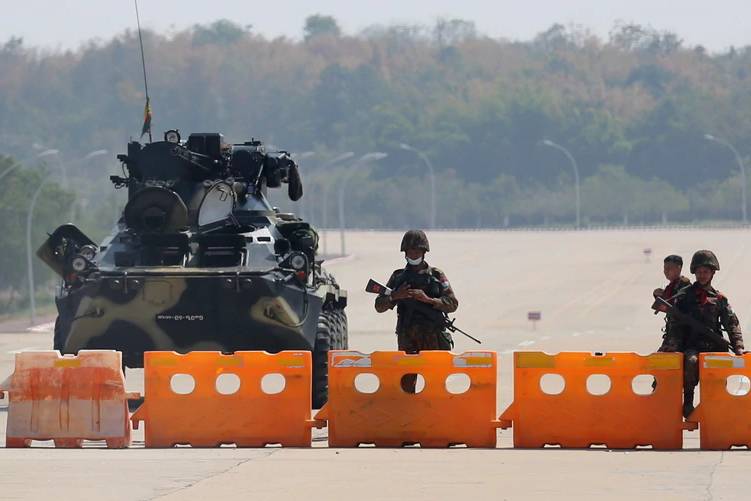KUALA LUMPUR, MALAYSIA - A Monday morning power grab by Myanmar’s military has set the country’s nascent democratic reform drive back at least a decade and will likely bolster what were already growing ties with China and Russia, analysts say.
The military declared a one-year state of emergency hours after detaining several senior members of the National League for Democracy party including the country’s de facto leader, Aung San Suu Kyi. The military claimed its complaints of mass voter fraud in last year’s general elections had gone ignored.
The NLD defeated the military’s proxy Union Solidarity and Development Party on its way to winning a second straight landslide election on Nov. 8. While local and international poll watchers complained of disenfranchised electors and election commission bias, they broadly agreed that the official count reflected the voters’ will.
Reuters reports that soldiers have taken up positions across Naypyitaw and Yangon, the country’s capital and commercial hub, respectively, and that phone and internet connectivity have dropped sharply.
VOA could not reach sources inside Myanmar Monday morning.
“Obviously this is a very dramatic step back for democratic reform in Myanmar,” said Peter Mumford, Southeast Asia analyst for the Eurasia Group, a political risk consultancy.
Myanmar’s powerful military was already well-entrenched in the country’s politics. After decades in total control, the generals ceded some power to a quasi-civilian government in 2011 but first drafted a constitution that guarantees them control over the military, police and borders and a quarter of the seats in parliament, enough to block any amendments that would change that.
Myanmar General Min Aung Hlaing
Military chief Min Aung Hlaing, who was due to step down this year after hitting the official retirement age of 65, was also widely reported to have his eye on the presidency. Barred by the constitution from holding that job herself, Aung San Suu Kyi, as state counselor, had appointed her own allies to the post instead.
Mumford said that likely played a role in the coup.
“The NLD was reluctant to give him the presidency, obviously because it would mean them losing a lot of power and the military gaining too much, and as a result the military has decided to launch a full coup, and that’s obviously taking us back sort of 10 years or so,” he said.
The military first took power in 1962, only four years after the country’s independence from Britain, bringing on decades of often brutal junta rule and economic malaise.
The latest military takeover will again be “devastating” both politically and economically, said Christina Fink, a professor at George Washington University in Washington, D.C., who studies Myanmar.
“As this semi-civilian government took root, people started to feel that they had the ability to speak out, to choose people to represent them, to have a government that was trying to address some of their concerns, and that’s been taken away from them again,” said Fink.
As for the economy, she said many of the tourists and investors who might have otherwise come or returned to Myanmar as the COVID-19 crisis fades will likely stay away.
The economic bite will also depend on whether the military’s actions bring on new sanctions, and what sort.
“The impact would really depend on how many countries and which countries are imposing them, and also what’s happening domestically in the country and which international powers are standing with the military,” said Fink.
Mumford said China would be a likely ally of the new junta, having helped prop up the last one for decades and more recently shielded Myanmar from much of the international fallout over the persecution of the country’s ethnic minority Rohingya.
“China will continue increasing its influence in Myanmar and want to ensure that, so China will look to work with this … interim military administration,” he said. “And as long as that interim administration is protecting China’s interests or working in what China sees as its interests, then it’s likely to be supportive.”
Beijing has been pouring billions of dollars into an “economic corridor” connecting western China to the Indian Ocean through Myanmar to establish a new route for its oil and gas imports that avoids the Malacca Strait, a potential choke point in the event of conflict with the U.S.
Mumford said the impact of any Western sanctions would also be dulled by Myanmar’s increasing trade and investment ties with other East and Southeast Asian countries.
“These are unlikely to take a stance on the [military] issue because they have a longstanding policy of non-interference. And so, I think Western sanctions will have only a limited impact and are unlikely to make the … military leaders rapidly change its mind,” he said.
Myanmar’s generals would have already factored possible Western sanctions into their calculations anyway and launched their takeover despite facing targeted sanctions over the Rohingya crises already, he added.
Fink also expects any moves by Western powers to isolate a military-run Myanmar to drive the country closer to Russia, giving it a second ally on the U.N. Security Council.
“The Myanmar military has grown closer and closer to Russia in the last several years and has bought a lot of weaponry from Russia,” she said, “so it seems likely that they will be able to count on the support of Russia.”
(VOA)

